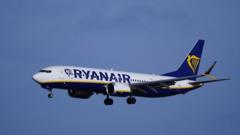Tens of thousands of travelers are facing significant disruptions due to a two-day strike by French air traffic controllers affecting flights across Europe. Ryanair, the budget airline, reported that it had to cancel more than 170 flights, impacting the travel plans of over 30,000 passengers. The strikes are primarily driven by two French unions protesting against working conditions, resulting in a quarter of flights being cancelled at major Paris airports and even higher cancellations in Nice.
French Transport Minister Philippe Tabarot criticized the unions' actions, labeling them as unacceptable during a peak holiday period. Ryanair highlighted that the strike affected not only its flights to France but also routes over French airspace to popular destinations such as the UK, Ireland, Spain, and Greece. The airline's CEO, Michael O'Leary, condemned the air traffic controllers, claiming they were "holding European families to ransom" and demanded intervention from European Commission President Ursula von der Leyen to safeguard flight services during such strikes.
In response to the disruption, France’s civil aviation authority, DGAC, advised airlines to revise their flight schedules across the country. Future disruptions are anticipated, particularly at Paris's Charles de Gaulle, Orly, and Beauvais airports, where flights are expected to decrease by 40% on Friday. The UNSA-ICNA union, responsible for the strike, is advocating for better staffing, management practices, and the cessation of a contentious clock-in system for air traffic controllers.
Airlines for Europe (A4E), the leading aviation organization in the continent, termed the strike "intolerable," warning it would lead to severe disruptions during one of the busiest travel seasons. EasyJet, another affected carrier, shared its disappointment and called for a swift resolution. Despite these disruptions, Ryanair indicated that it had successfully operated over 109,000 flights in June, suggesting that less than 1% of its flights were affected overall.





















